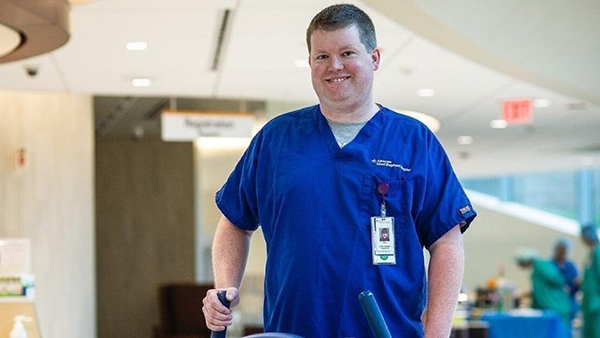Registered Nurse (RN) – Stroke Certified Inpatient Rehabilitation
Job ID:
R111582
Shift:
2nd
Full/Part Time:
Full_time
Location:
Aurora St Lukes Medical Center – 2900 W Oklahoma Ave
Milwaukee, WI 53215
Benefits Eligible:
Yes
Hours Per Week:
40
Schedule Details/Additional Information:
8 Hour PM shift 1500-2330Holiday and weekend requirements
Aurora St. Luke’s Medical Center is seeking Registered Nurses to join our extraordinary team of Inpatient Rehabilitation Nurses!!!
Perks of joining Inpatient Rehab:
- Up to $20,000 Loan Support Program!
- Up to $10,000 Sign-on Bonus!
- We offer 1st, 2nd, 3rd, and Weekend Program schedule (8- and 12-hour shift options)!
- We offer competitive wages along with excellent benefit package.
- Be part of a team or nurses whose sole purpose is to help people live well!!!
Special Note: The Inpatient Rehabilitation unit is a great unit for RNs with a goal to work in community, population health, or in home health in the future; as well as nurses who want to advance to specialty areas.
Overview:
Inpatient Rehab (IRP) is a stroke certified rehabilitation program accredited by the Commission of Accreditation of Rehabilitation Facilities (CARF). Admission to the unit is considered a separate admission from the acute care area, but the unit is considered, and supported by all the hospital services at Aurora St. Luke’s.
Approximately 50% of the patients admitted to the unit have Neuromedical diagnosis such as: Strokes, Parkinson’, Multiple Sclerosis and brain injuries with other neurological impairments.
Other populations served include:
- Transplant patients including pre and post organ transplant; and patients who may not qualify for heart transplant and require LVAD implantation.
- Post limb amputation
- Joint replacements
- Oncology
- Dialysis
- Hyperbaric Oxygen Program (HBO)
Nurses work with multiple populations with patients working with the therapy department for three (3) hours, minimum, each day. Therapy includes PT/OT and speech as appropriate. There are multiple skills to learn and very in-depth discharge planning which starts on day one of a patient’s admission. Discharge planning involves carry-over of therapy skills, teaching patients and families’ various skills that the patient will need to learn to live with a life-changing illness or injury. Approximately 80% of patient go home resuming most of their home activities.
Responsible for providing and coordinating comprehensive patient care through the nursing process to deliver safe, therapeutic care in accordance with established standards, policies and procedures. Using evidence-based practice, clinical decision making, compassion and skilled communication, leads efforts to create the safest patient environment and the best patient experience across the continuum.
Major Responsibilities:
- Uses the nursing process to assess the needs of the patient, plan and implement individualized interventions and evaluate the effectiveness of the plan of care. Includes the patient and family in planning and implementing care and develops and maintains a therapeutic relationship throughout the healthcare continuum.
- Anticipates and recognizes significant changes in the patient’s condition, status, and need for care. Provides ongoing assessment of the patient and takes appropriate actions when changes occur. Anticipates and alters the plan of care as needed, mobilizes appropriate resources, and collaborates with other health care team members to coordinate patient centered care.
- Implements strategies to reduce patient risk and increase patient safety. Assesses patient and family readiness to learn and individualizes the approach as necessary. Works collaboratively to develop strategies to meet the learning needs of the patient and family.
- Actively coordinates the discharge plan utilizing an interdisciplinary approach. Applies evidence-based practice to deliver patient care. Consistently incorporates nursing and regulatory standards of care into practice.
- Provides ongoing evaluation of patient, team, and unit outcomes and is empowered to take appropriate action when changes are needed. Supports shared governance activities and initiatives to improve processes and patient outcomes.
- Demonstrates effective communication, feedback, and conflict resolution skills. Promotes collaboration among healthcare team members. Assumes a leadership role in the care team and delegates appropriately to unlicensed personnel.
- Promotes a culture of safety through identifying threats to patient safety and intervening to prevent patient harm. Reports patient safety events and near misses in a timely manner. Seeks to identify potential safety issues and assists in the implementation of corrective actions.
- Applies ethical decision making, demonstrates respect and understanding for peers, and other clinical disciplines. Participates as an effective member of the patient care team to formulate an integrated, unbiased, individualized approach to care.
- Participates in quality/process improvement initiatives to improve the functions of the department and the patient care experience.
- Participates in professional activities which contribute to personal professional development and the development of others. Seeks opportunities to be taught, coached, and mentored. Attends required meetings/educational programs and completes annual competencies in a timely manner.
- Must be able to demonstrate knowledge and skills necessary to provide care appropriate to the age of the patients served. Must demonstrate knowledge of the principles of growth and development over the life span and possess the ability to assess data reflective of the patient's status and interpret the appropriate information needed to identify each patient's requirements relative to his/her age-specific needs, and to provide the care needed as described in the department's policies and procedures. Age-specific information is developed further in the departmental job standards.
Licensure, Registration, and/or Certification Required:
- Registered Nurse license issued by the state in which the team member practices, and
- Basic Life Support (BLS) for Healthcare Providers certification issued by the American Heart Association (AHA).
Education Required:
- Completion of an accredited or approved program in Nursing.
Experience Required:
- Typically requires 1 year of experience in clinical nursing.
Knowledge, Skills & Abilities Required:
- Demonstrates progression to provide holistic patient care and the ability to view clinical situations from a patient and family focus.
- Demonstrates progression to recognize situational changes that require unplanned or unanticipated interventions, and responds to situations with confidence, timeliness and flexibility.
- Proficient computer skills, use of electronic mail and electronic medical records systems.
- Excellent communication (written and verbal), listening and interpersonal skills.
- Demonstrates human relation skills with the ability to develop rapport and maintain positive, professional relationships with a variety of patients, team members and physicians. Ability to take initiative and work collaboratively with others.
- Demonstrated ability to effectively make critical, independent decisions.
- Excellent organization, prioritization and problem-solving skills.
- Demonstrates time management skills with an ability to multi-task and prioritize in an environment with frequent interruptions.
- Demonstrates coordination, collaboration, delegation and team building skills.
Certification Addendum:
- Team members will maintain annual educational requirements for hospital based certifications (e.g. DNV, CARF or others)
Physical Requirements and Working Conditions:
- Must be able to sit, stand, walk, lift, squat, bend, reach above shoulders, and twist frequently throughout the workday.
- Must be able to:
- lift up to 50 lbs. from floor to waist.
- lift up to 20 lbs. over the head.
- carry up to 40 lbs. a reasonable distance.
- Must be able to:
- push/pull with 30 lbs. of force.
- perform a sliding transfer of 150 lbs. with a second person present.
- Position requires use of foot pedals on carts or machines.
- May be exposed to chemical and hazardous waste as well as blood and body fluids and communicable disease. Therefore, protective clothing and equipment must be worn as necessary.
- Must have functional speech, vision, hearing, and touch with ability to use fine hand manipulation skills for IV insertion and other procedures/functions.
- Operates all equipment necessary to perform the job.
This job description indicates the general nature and level of work expected of the incumbent. It is not designed to cover or contain a comprehensive listing of activities, duties or responsibilities required of the incumbent. Incumbent may be required to perform other related duties.
Aurora Health Care is the largest health system in Wisconsin and a national leader in clinical innovation, health outcomes, consumer experience and value-based care. The state’s largest private employer, the system serves patients across 17 hospitals, more than 70 pharmacies and more than 150 sites of care. Aurora Health Care, in addition to Advocate Health Care in Illinois and Atrium Health in the Carolinas, Georgia and Alabama, is now part of Advocate Health, the third-largest nonprofit, integrated health system in the United States. Committed to providing equitable care for all, Advocate Health provides nearly $5 billion in annual community benefits.

















